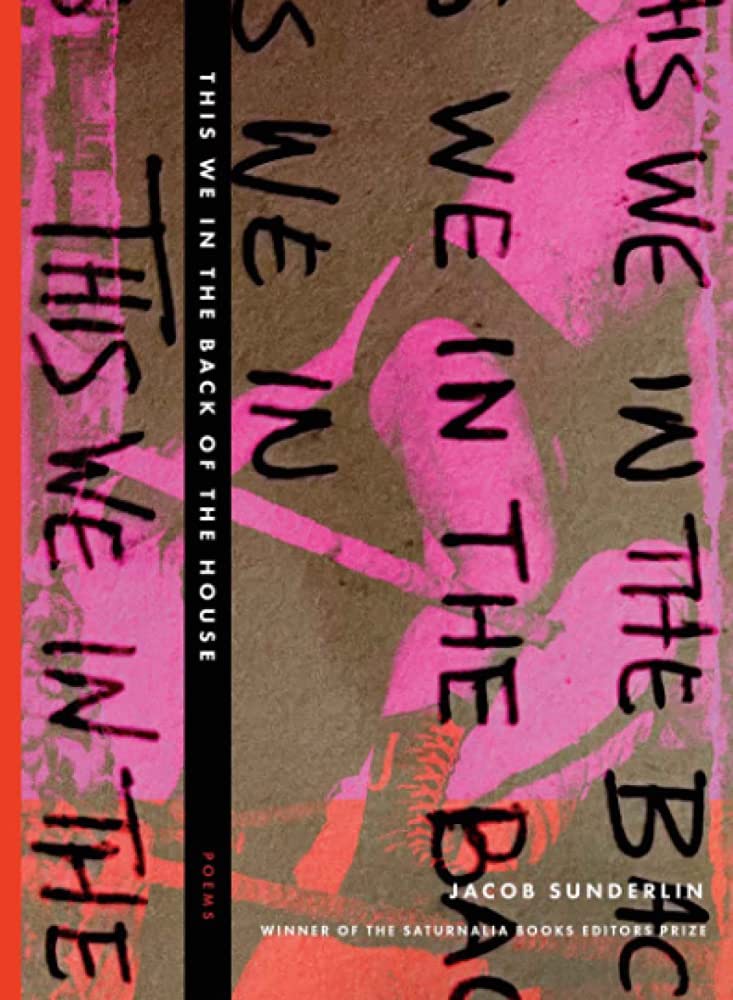
Jacob Sunderlin.
This We in the Back of the House.
Saturnalia Books, 2022.
ISBN 978-1947817487
Let’s make praise: Jacob Sunderlin’s debut, This We In The Back Of The House, is an often bruising and intrepid collection of Indiana-based poems—something like James Wright’s Ohio, but unlike Wright’s Ohio, Sunderlin’s Indiana has some Monk, some Lester Young, even some Axl Rose (that troubled Hoosier), all taking solos (with space to blow) under the lights, in lines that pop and hiss—the spark of a cheap lighter arcing over a field-length sheet of moonlit aluminum.
This We In The Back of the House takes me back to the University of Wisconsin in the mid 1980’s when I was a stone-cold naïf, raised among working-class wolves in one of those boarded-up rustbelt towns in southeastern Wisconsin. I remember sitting in a huge freshman English class when we were assigned Jim Daniels’ Places/Everyone. The book hit me like a brick—all those struggling souls looking for a way up or out during the not-so-slow-motion implosion of industrial Detroit. Daniels gave us the layoffs, the closures, alcoholism, tools, short order cooks, violence, line workers, machines, rust (of course) and cars, cars, cars—his metaphoric pair of jumper cables showing some Cadillac-stranded folks how to jump their own car in the cold of a Detroit winter. In Places/Everyone, even the moon came at you “like a headlight.”
Jacob Sunderlin isn’t content with the mere cataloguing of slights and ills. Instead, he fashions balms, post-fight, little sacred refuges after a beating, it might even be “…an invisible place…” where, “once I carried bricks for a living . . . . listening / to the given names of things . . . / They said . . . Live trap, blue tarp, / alligator clips & gasoline. / They said the Sawzall, the loppers, / that panel from the truck Ben rolled last year—.” In other words, if you can name it, mix it and stack it, it just might stand even if there’s no one around to say thanks. Even if an industrial-sized void threatens to grow inside these poems, the speaker knows from experience there’s real actual victory to be found in the names and functions of what’s at hand where “everything broken // gets fixed.”
These poems grapple and contend like the prancing, mock-menacing collection of professional wrestlers who batter themselves bloody throughout the book—brawny, Technicolor idols sacrificing themselves for the dishwashers, brick layers and line workers at the Frito-Lay plant that populate this weedy corner of the Indiana landscape. We get Mankind vs The Undertaker, and here comes The Macho Man Randy Savage “dropping his big elbow on a sky,” wearing “the orange cowboy hats / of ridiculous kings.” Brothers and sisters, you can’t do it alone, sometimes we need larger-than-life friends. Sometimes you need a real uncle too, or a brother you can pin down and make the demand before you’ll release him to “give me my name. Say it.”
There may come a time too, when you’ll need a veteran of our latest longest war to help jumpstart your car in winter. He’s your neighbor, the one who does drunken “furious / pushups in his underwear” on his porch. Learn his name. A boyfriend, a girlfriend, a friend-friend, a lover, a buddy, a soothing voice that may only be in your head, someone you might call “Sugar,” as Sunderlin does, in a series of recurring Talking to Sugar About… poems. You can talk to Sugar about work, about the afterlife, at last call. Sugar works three shifts a day. Sugar is in the know and the now. Sugar can tell you all about the new boss because “Sugar has been fired by more chickenshits” than can be counted. Most importantly, Sugar is the one, the rarest one, who can make you laugh on company time, standing stoned in the mud of a hog farm where, “Sometimes he goes into the boss’s garden / to pick her squash which he says she calls sqwawush.”
In short, if you want to be taken somewhere, slip a copy of This We In The Back Of The House into your bag, tote it around awhile, pull it out, you’ll find that in these poems there’s a big beating heart meeting serious craft. They’ll stay with you awhile. You might even think about this limping-along-someplace called Indiana where “ . . . work starts with light. / It comes up across / the truck bed of this / bleached-out county, eye-gouge bright. /A lighter off aluminum foil.”
Plume: Issue #140 April 2023
